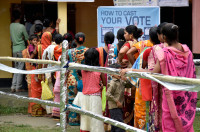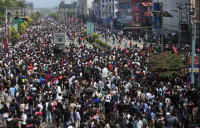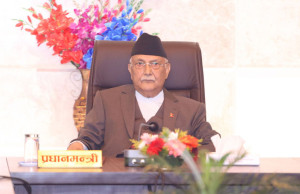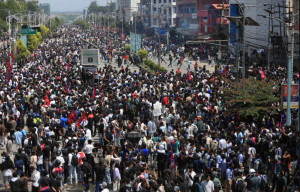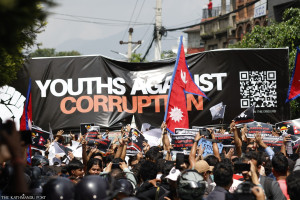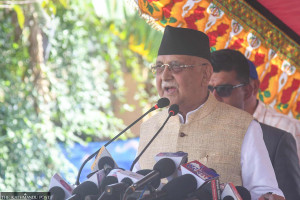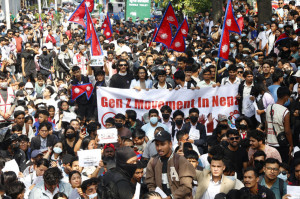Columns
Socialism: A national ‘bluff'
Nepali political parties are competing to prove themselves purer socialists than others.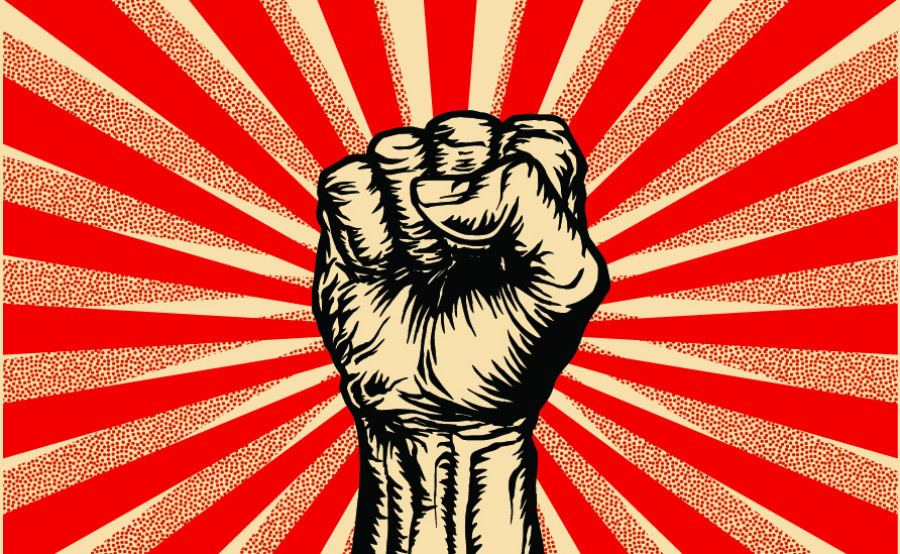
Achyut Wagle
Even in the era of the meteoric rise of ultra-right politics globally, Nepal is among a few countries whose politics is dominated by socialists of different shades. From democratic socialists to moderate Leftists to Marxists and Bolsheviks to Bolivarans, all dream of establishing a classless society under a single-party dictatorship. Not being a socialist in this country is a political sacrilege and, ostensibly, becoming anti-development, if not outrightly anti-national. Nevertheless, almost all of these pipe dreamers have accepted the “mainstream” adult franchise-based parliamentary democracy.
Not being socialist also (perhaps) goes against the Constitution. This is because, in at least three instances, The Constitution of Nepal 2015 categorically mentions the term “socialism” while defining the nature of the Nepali state. The preamble states that the constitution was issued as its formulator, the Constituent Assembly, was “committed to socialism”. Article 4(1) defines the State of Nepal as “an independent, indivisible, sovereign, secular, inclusive, democratic, socialism-oriented, federal democratic republican state”. Under the Directive Principles (Article 50, Clause 3), the objective of the State is “to develop a socialism-oriented independent and prosperous economy.” Tragically, the constitution has skipped the definition of the term “socialism”, making it a paradise for the interpretation of convenience.
Political stunts often resurface to save socialism from falling from grace. When Pushpa Kamal Dahal, the chairman of the CPN (Maoist Centre), was prime minister, he formed a socialist front last January, including three other left parties—Janata Samajbadi Party, CPN (Unified Socialist) and CPN (Biplov). Now out of power, Dahal is trying to bring other fringe parties into the fold for a more organised opposition to the current government. There have been several efforts in history to unite the so-called socialists. But in practice, opportunism has homogenised Nepal’s every political outfit into a power-hungry brute force without principle, let alone ideology. The travesty, however, is that the fundamental allegation to demean one party by the other, mainly among the communist parties, is “the blatant abandonment of the principles of socialism.”
Outdated narratives
Socialism takes refuge in utterly outdated socioeconomics and ecopolitical narratives for its survival. The overarching prescription is that the state must not only provide free health and education but also reduce the private sector’s role in the economy. The constitution includes free education up to the secondary level, free basic health care and gainful employment as fundamental rights.
The socialists see all economic and political ills as the outcome of engulfing trends of liberalisation and globalisation. They still advocate for land reform that ensures entitlement of the “land to the tiller”. However, in reality, the younger generation is unwilling to own farms as they are moving away from agriculture to modern sectors of employment and entrepreneurship. Huge amounts of fertile land are increasingly being left uncultivated for want of people opting for farming. Besides, the unplanned drive of land fragmentation has converted entire farmlands into unfeasible patches for commercial-scale production of agricultural products. Failed land use planning and haphazard urbanisation have further eroded the prospects of the land used for agriculture.
The pro-socialist crusade may not have appeared vocal to stop the privatisation of highly loss-making state-owned enterprises, stall private sector economic reforms and discontinue the centralised planning process, but they have crept into every aspect of economic policy-making. As a result, the economy is persistently left without a development model, and growth has stagnated beyond endurance. Nepal’s market integration with even the regional market is very limited, and the economy, seemingly irreversibly, becomes import-dependent, draining out capital and young brains.
Ramifications
The discourse itself is anachronistic. The political parties are not competing to be forward-looking and pro-reform but to prove themselves purer socialists than others. This is rapidly disconnecting the political parties from the political system the country has adopted at a great opportunity cost and from the economic system that must generate output to increase public well-being.
Philosophically, socialism with intended control of the state is the opposite pole to federalism, which seeks to devolve political and economic power closer to the masses. But most of Nepal’s political parties are playing devout socialists and ardent federalists. So, it is no surprise that federalism has been able to produce only suboptimal results during the last seven years of its implementation. The subnational political and administrative units created akin to the federal setup for all practical purposes remain subservient to the power concentrated at the centre. The concept of the controlling “central” government is finding it hard to convert into a coordinating “federal” government.
The socialist idea of every facility being financed by the state certainly looks benign on the surface. This simply means the state treasury has to be adequately filled and continuously replenished to fulfil all existing public demands for services and facilities and be enough to meet future aspirations for improved quality of life. Without a reliable revenue source, the state can neither finance better public delivery nor develop infrastructure for the future. Nepal is now exactly in this trap.
The real paradox of the socialist model of state-managed economy lies exactly here. Revenue on a convincing scale can only be generated if private sector investment substantially increases productivity, profit, employment and personal income. The state financing everything, even if it becomes a basic right included in the constitution, is impossible without making the market economy sizable, vibrant and capable of paying taxes. Such a market is impossible to imagine without unhindered private sector investment. Foreign investment is the new paradigm in the economies with comparative advantage. However, the very idea of a state-controlled socialist economy is perhaps enough to turn the heads of foreign investors away from the economy in question.
Even Karl Marx’s Das Kapital advocated for the highest level of capital growth for extreme exploitation to explode into revolution. However, Nepali socialists didn't even recognise the importance of the inevitable expansion of capital for a state. The state apparatus has evolved since Marx to prevent extreme exploitation. Also, capitalists need not be exterminated by violence but can be constructively made liable to duly paying tax to the state.




 18.12°C Kathmandu
18.12°C Kathmandu
